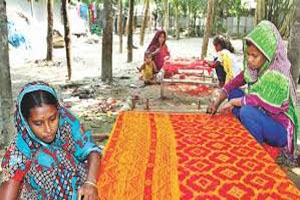
Jamdani weavers of Tangail busy eyeing Eid market
YarnsandFibers News Bureau 2017-06-08 17:00:00 – DhakaOver the time although Muslin Saree has lost its existence but the Jamdani, Benarasi and Tant Sarees of Tangail have survived to this day. Tangail is a city of Dhaka Division in the central region of Bangladesh famous for Tangail's jamdani sari, a special type of Saree which is made exclusively by the weavers in Tangail completely made by hand work, not by hand and foot operated machines.
Tangail weavers have their hands full these days, busily creating contemporary and traditional sari designs in a kaleidoscope of patterns and colours in the lead up to this year's Eid al-Fitr festival. Cotton and silk jamdanis in celebratory tones representing the full range of quality and price are expected to attract thousands of buyers in what is the year's busiest sales period.
Most local weavers specialise in producing jamdanis on their handlooms nowadays, says Raghunath Basak, one of Pathrail's weavers. By Raghunath's estimate cotton saris will sell this year for between Tk 1,000 and Tk 4,000 while silk pieces can be expected to retail from Tk 2,000 up to Tk 60,000. To produce a jamdani requires at least three days' work and longer for a finer, more intricate piece.
Tangail's saris are available in a wide range of fabric blends and styles including cotton, jute cotton, silk, soft silk, half silk, indri silk, dotari silk, katan, koda, khaddar, banaroshi, dhansiri, ektari, patabon and more. Indeed, individual weavers commonly produce more than one quality and style.
Tangail's weavers inevitably offer something new each Eid, said sari trader Ratan Basak. They have introduced new colours and designs this year too. He notes the distinctive embroidery that is often added to sari borders including in traditional Bangladeshi alpona designs. Bold, festive colours predominate, including magenta, ash, red, yellow, orange, violet, blue and green, as well as black and white.
Traders at Karatia market in Tangail sadar upazila said that Tangail's sari industry which is increasingly focused on exports as well as growing domestic demand and employs up to 2.5 lakh workers, brings to the district around Tk 200 crores in sales each Eid season. Weavers have already sent a good part of their production to different markets and shopping malls across the country, starting before Ramadan.
According to the Bangladesh Bureau of Statistics, among 12 Upazilas in Tangail, from 34678 looms around 76 thousand weavers are currently involved in the production of Tangail Saree. A large numbers of Sarees are usually sold in the season of two Eid , Puja, Pahela Boishakh and wedding ceremony during the period between November and February.
Currently, for the popularity of Tangail Saree, the reputation of saree weavers of Tangail has exceeded the national boundary and have reached worldwide. It has gained popularity across the border in South Asian countries, even in Europe, America and Japan. Soft silk and cotton weaving have revolutionized Tangail Saree.
Market Intelligence
Ask for free sample Report

experience
Customer Base
dedicated team
Countries Served Worldwide









